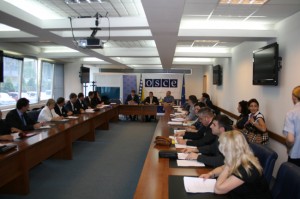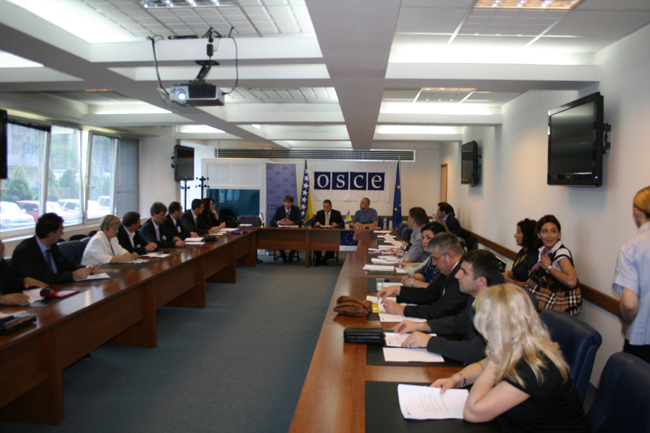OSCE – Organisation for Security and Co-operation in Europe is the largest world regional security organisation, consisting of 56 member countries.
Established as a regional arrangement pursuant to the Chapter VIII of the United Nations Charter, OSCE is a forum for political negotiations, with the emphasis on prevention of conflicts, crisis situation management and post-conflict recovery.
 The General Framework Agreement for Peace in Bosnia and Herzegovina, initialled in Dayton and signed in Paris in the end of 1995, which ended almost four years of conflicts, forms the work of the OSCE Mission to Bosnia and Herzegovina.
The General Framework Agreement for Peace in Bosnia and Herzegovina, initialled in Dayton and signed in Paris in the end of 1995, which ended almost four years of conflicts, forms the work of the OSCE Mission to Bosnia and Herzegovina.
With this Agreement, the OSCE Mission was determined as one of the organisations responsible for rendering assistance in securing permanent peace in Bosnia and Herzegovina which also implies rendering assistance in recovery of the country upon conflicts, in order for it to become stable, secure and democratic country.
OSCE has a comprehensive approach to security matters: it comprises military-political, economic, ecological and human dimension of security.
The Organisation’s activities comprise control of armament, measures of building trust and establishing security, human rights, national minorities, democratisation, police work strategy, anti-terrorism, as well as economic and ecological activities.
The organisation and enforcement of the Organisation’s activities also require a responsible and professional team of people. In order to present the OSCE’s activities and requirements for organisation of successful seminars to the readers of SEEbtm magazine, we had a conversation with Mrs. Mersiha Causevic-Podzic, a spokesperson of the OSCE Mission to B&H, who was kind enough to answer a couple of questions.
1. How important are organisation and presence at the seminars and conferences in the operation of your Organisation?
With a view to enforcement of activities and programmes within our mandate, presence at the seminars and conferences is very important for us. Also, we try to satisfy the needs for training for the employees of the OSCE Mission to Bosnia and Herzegovina, so we organise internal trainings according to the needs indicated in our annual schedule.
2. How often do you organise meetings (presentations, round tables, seminars, conferences)?
Throughout a year we organise various presentations, round tables, seminars, or conferences – sometimes even more events during one week (depending on importance of subjects and needs within the OSCE Mission mandate in B&H, which varies from several times a month to once a week).
3. How much in advance do you plan organisation of an event? Do you usually delegate organisation to some external agency or you have a person from OSCE who is in charge of planning and realisation?
 We do not delegate organisation to external agencies, and the period of planning depends on complexity of programme content we enforce and ”size” of the meeting.
We do not delegate organisation to external agencies, and the period of planning depends on complexity of programme content we enforce and ”size” of the meeting.
The preparatory stage of an event sometimes takes from two weeks to several months, which depends on given tasks, number of participants, venue, etc…
4. What is the most important thing for you at selecting location, venue, and agency for organisation of an event?
Many elements are important at selecting location, venue, and agency, and a specific order by importance depends on specific event and varies upon it. Naturally, capacity, technical equipment, location, parking, and hotel services must correspond to our needs for the given conference.
In addition to that, professionalism of the staff, security, quality/safety of food and the offered contents, as well as price (OSCE does not select high categories of hotels, but the ones towards the middle of categorisation). When it is about internal trainings, we constantly use all our available resources, including training rooms and persons delivering trainings.
5. How long do the events organised by you usually last? Is it about one-day or several days’ events?
Most frequently these are one-day events, with three-days-duration at the most. The events longer than the mentioned are extremely rare.
6. Where in the region do you organise conventions and meetings? Why is this location/venue your choice?
We organise our events in B&H. A specific choice is most frequently in function of minimizing travel time for participants, i.e. reduction of costs/duration of event.
7. Could you tell us something about a framework schedule of activities for 2011?
With a view to implementation of the programme of activities for 2011, the OSCE plans organisation of a large number of round tables, presentations, and workshops, as well as a specific number of several days’ seminars and conferences. A detailed schedule is presented in the plans of programme activities of our programmes, and all the employees have been familiarized with these plans in detail.









































 Srpski
Srpski English
English